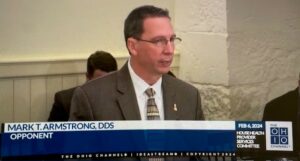Gongwer: Ohio’s home for policy & politics
First published February 7, 2024, republished with permission
Dentists on Tuesday laid out their concerns about a bill that would enlist Ohio in a multi-state compact that they said would harm the state’s patient protections.
However, a representative from the Council of State Governments, which created 16 compacts of seven of which count Ohio as a member, said that the language of the bill (SB 40) utilizes best practices, offers flexibility and uses language similar to more recent compacts.

The plan to join the Dentist and Dental Hygienist from Sen. Kristina Roegner (R-Hudson) passed unanimously out of the Senate Health Committee without any opponent testimony and then passed unanimously on the Senate floor.
It began drawing criticism from Democratic and Republican members of the House Health Provider Services Committee during the second hearing.
Several said Ohio’s high standards for dentistry could be undercut by another state that joined the compact with lower standards. (See Gongwer Ohio Report, December 12, 2023)
Chair Rep. Al Cutrona (R-Canfield) noted that in his time at the Statehouse no other compact has drawn pushback.
“This is the only compact I’ve seen that has any hiccups,” he said.
Guy Shampaine, an oral surgeon and former chair of the Joint Commission on Dental Examinations, told the committee that the dental compact has “markedly differently” protections than those included in the medical and nursing compacts.


Among those, he said, is that in Washington, which already adopted the compact, the State Dental Board is prohibited from considering criminal history and allows for the licensure of dentists with criminal records for assault or sex offenses.
He also said the compact does not require a psychomotor hand skills examination for surgical dentistry, that some states have less stringent regulations than Ohio regarding sedation and prescriptions, and that compact states cannot enforce continuing education requirements, among other concerns.
“The philosophy of the medical and nursing compacts was to provide portability with the same public protection principles currently in place in those states,” he said. “Unfortunately, SB 40 does not include those safeguards. This compact can serve as a back door to practice in Ohio for individuals who otherwise are not qualified to practice in Ohio.”
Mark Armstrong – a dentist in Troy, chairman of the CDCA-WREB-CITA, which administers dental board exams, and a former chair of the Ohio State Dental Board – offered three cases he adjudicated while on the OSDB in which the board would have been powerless had any of the dentists been practicing under a compact privilege.
“I am not alone in my concerns,” he said. “I have spoken with several former members of the Ohio State Dental Board and they agree with the deficiencies of Senate Bill 40.”
Rep. Beth Liston (D-Dublin) questioned some of their assertions, highlighting language in the bill that she said could assuage their concerns.
Shampaine explained that there is a difference in what states can do as a licensing state compared to a compact state.
Armstrong told Rep. Justin Pizzulli (R-Franklin Furnace) that they would have testified before the Senate had they known about the proposal.
Cutrona asked what changes would need to occur to get them “on board.”
Shamaine said there needs to be provisions about criminal and disciplinary history as well as a uniform standard of testing.
Matt Shafer, of the Council of State Governments countered that the language of SB40 largely mirrors more recent compacts, including those for social work (SB 90) and massage (SB 56 ).
He said the dentists were comparing the compact at hand to the medical and nursing compacts that feature stringent rules around criminal and disciplinary history.
“Those were drafted over 10 years ago,” he said. “From our perspective we’ve seen a shift in public policy in terms of how we treat people in the criminal justice system and moving away from broad blanket bans to more individualized considerations” as is written into more recent compacts.
He added that during the development phase, no one raised concerns about the criminal history-related compacts.
“We’ve honed our process over the past decade, and we believe this compact is no different,” he said.
Cutrona questioned why the compact does not require a hands-on test as has been used in Ohio for many years.
Shafer said they did not want to specify any particular exam to ensure that the compact could continue to operate even with a shift in individual state policy.
“The compact is drafted broadly so it can grow and evolve with the profession,” he said. “IF we say it has to be hands-based, and then a bunch of states use different models in 20 years, the compact would become irrelevant.”
The committee also received written testimony from Kimber Cobb, executive director of the American Association of Dental Boards, who said the bill has the potential to exclude the voice of dental hygienists from the compact board.
Cobb also noted that amendments were made to legislation that allowed Ohio to join the nursing compact (SB3, 134th General Assembly).
In contrast, Marla Morse, executive director of Oral Health Ohio, said the proposal is an opportunity to attract more dentists and hygienists to the state.
“Ohio has been a leader in promoting licensure reciprocity and portability for many years,” she said. “SB 40 seems to be the next logical step for dental licensure reform in Ohio and a modest step towards increasing access to oral health care.”
